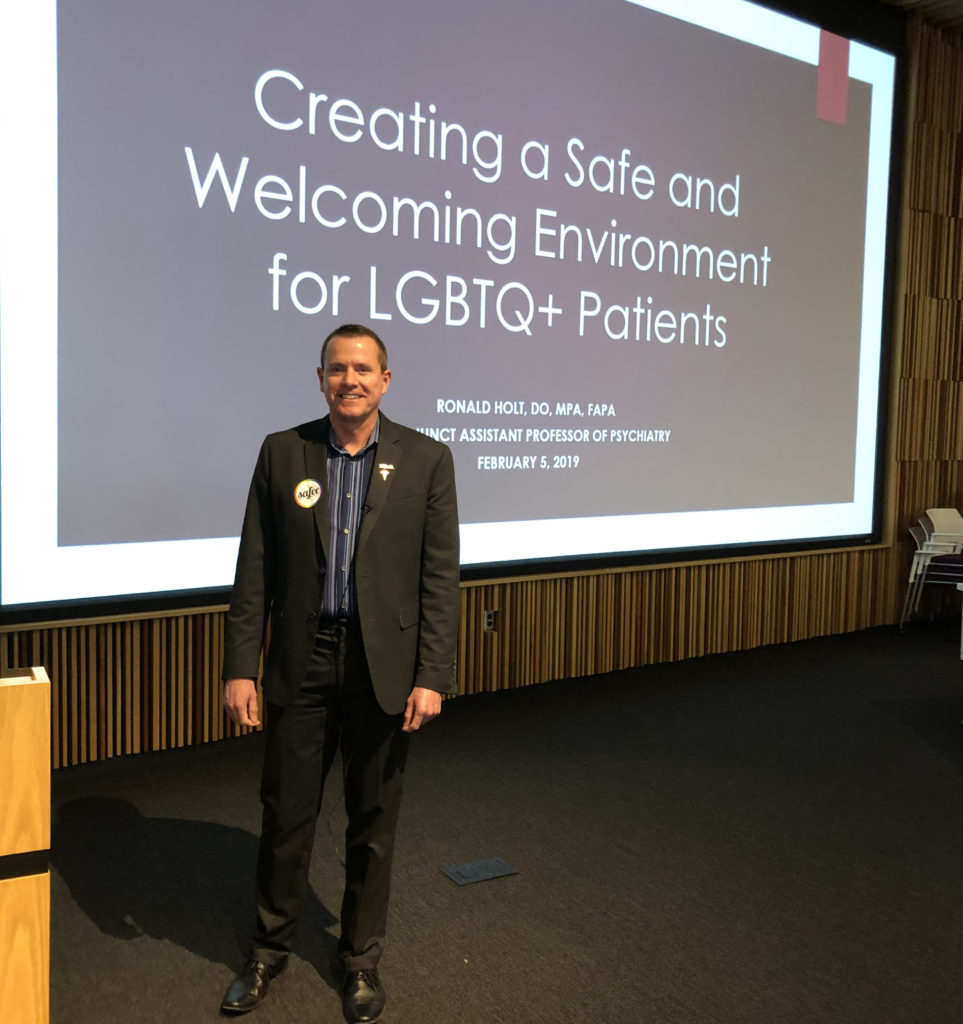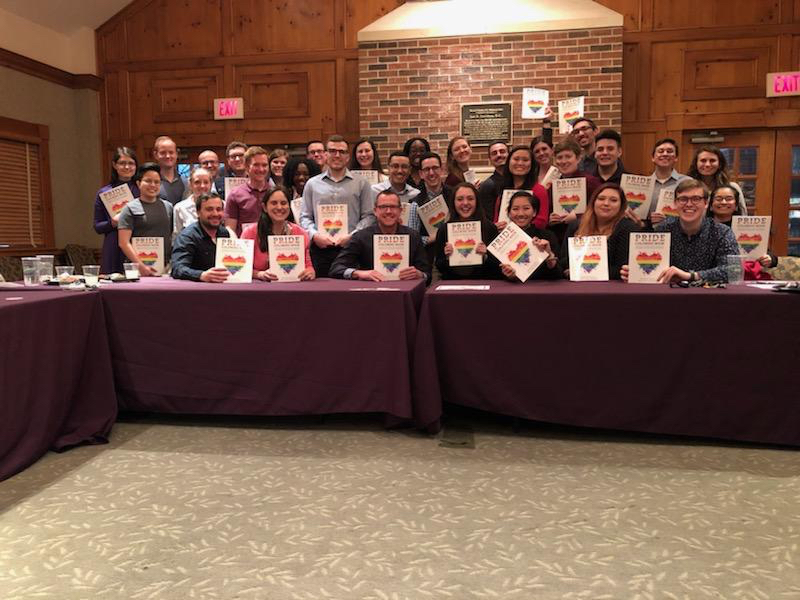Creating a Safe and Welcoming Environment for LGBTQ+ Patients
On February 4 and 5, Dr. Holt had the honor of returning to his alma mater, Kansas City University, to discuss LGBTQ+ healthcare with faculty, staff, students, and administration. His visit included meetings with administration, committees, and student groups on how to incorporate LGBTQ+ health into the curriculum. In addition, he had the opportunity to present workshops, presentations, sessions, and moderate a panel of LGBTQ+ patients in front of over 400 attendees.
Many topics were discussed on how to make the healthcare setting a safe and welcoming environment for LGBTQ+ patients, including the impact of the waiting room, intake forms, and patient interactions.
One of the highlights of the visit was a meet and greet with KCU’s SAFEE group, which is a student led advocacy group for LGBTQIA students. A book signing was held with SAFEE members.
The following are written comments from students who attended one or more of the Dr. Holt’s presentations:
This presentation was very informative and made me feel much more comfortable in my ability to professionally navigate a patient situation with LGBTQ+ issues. -22 y/o m
Very positive. Thank you for taking the time to come talk with us. I learned examples of how to best set the scene to make patients comfortable. – 27 y/o f
Dr. Holt is a wonderful presenter. My favorite part of the lecture was his ability to talk about all aspects of care. He discussed everything from the appearance of the waiting room to how to have an open discussion with LGBTQ+ patients. If the patient is comfortable talking with the physician, then it becomes easier for the physician to identify risk factors that may affect the patient’s health. – 23 y/o f
This talk has opened my mind on how to interact and fulfill the needs/concerns of the LGBTQ community to improve the quality of life for these individuals mentally, physically, and emotionally based on their personal struggles and life complications. – 23 y/o f
I hadn’t thought about small things/subtleties that can make my practice more accepting off the bat. The lecture and panel are integral to med school education and needs to be a mandatory part of curriculum. – 25 y/o f
I learned a completely new perspective of healthcare that I have never thought about before. – 24 y/o m
Today’s panel positively influenced the way I will approach patients that identify themselves as LGBTQ – especially trans patients. I am very glad that this training was provided to me and my classmates. I believe it makes the difference. – 25 y/o f
I will take this newfound knowledge about treating the LGBTQ community and apply it to my own clinical practice. I want to treat patients respectfully and be a resource. – 25 y/o f
This 100% needs to be a part of our curriculum. I feel empowered – am thankful for everything I learned because I feel better equipped to care for my patients. – 26 y/o f
This talk will help how I practice medicine and treat my LGBTQIA patients. – 23 y/o f
What a great experience to be able to hear from individuals in the LGBT community first hand about their healthcare experiences. This is a unique opportunity to hear about these experiences in a safe environment where students can ask questions. – 29 y/o f
I will be more open about addressing certain topics and showing/verbalizing acceptance. I learned strategies to open my conversations about gender and how the patient wants to be addressed. – 26 y/o f
Thank you very much! This will definitely help me care for future patients! I learned the risk of suicide attempts amongst the LGBTQ+ community – especially who is at the highest risk. – 25 y/o f
Amazing! This will prevent me from being assumptive and intrusive into my patient’s life without earning their trust. I learned how to open myself up and visibly be an ally well before I even meet a patient. – 28 y/o m
I will be more equipped to properly acknowledge not only my future LGBTQ patients, but also family. I learned NOT to encourage some one to prematurely come out. – 27 y/o f
Grateful that I and my fellow students can hear personalized experiences from people of the LGBTQ+ community. This is the kind of dialogue our school and ALL medical students need to have. – 26 y/o m
I will now better serve my future LGBTQ patients. I learned how to make the waiting room more welcoming. – 26 y/o f
Excellent lecture. Appreciated info on how I can incorporate open ended questions on my intake forms as well as in interviews. This will help me approach the topic without being too invasive. I also really appreciated you addressing how to address the anatomy that these patients may not identify with. – 30 y/o f
The most helpful new thing I learned was how to set the stage for talking about those issues without directly asking the questions. – 29 y/o m
This was the lecture I’ve been waiting for all year! Appreciated the real-life examples of how to interact with and gain the trust of our patients. This session reinforced the importance of pronouns and sensitivity when being a physician and advocate for my patients. – 27 y/o f
I really enjoyed listening to the panelists and learning how little things like a sign in your waiting room can make a huge difference. I also learned ways to phrase things to make my patients more comfortable. Lean into the uncomfort. – 24 y/o f
Provided good background info and good foundation on treating/managing the LGBTQ community. Gave insight into important things to pay attention to with this group. – 29 y/o f
Using the vocabs of LGBTQ people is very important. I will be more aware of the words I use in the future. Dr. Holt gave a lot of good examples of conversations and actions we can take to help LGBTQ population/patients feel more comfortable seeking appropriate healthcare and trusting their doctors. – 25 y/o f
I appreciated the advice from Dr. Holt on how to approach a discussion about doing sensitive exams on people who identity may not align with their anatomy. – 31 y/o m
Felt the first hour was useful in establishing current stats and severity of the issues that are being faced by the LGBTQ community. LGBTQ awareness and sensitivity are critical to providing quality care. – 24 y/o f
This reinforced pretty much everything I always believed. Also, gave me skills and abilities to be able to communicate with people within the LGBTQ community. – 27 y/o f
Thank your for your honesty in sharing your stories and opinions. This was super helpful to try to understand where trans patients are coming from. – 34 y/o f
I thought the panel was great. The statistic that 40% of adult trans individuals have attempted suicide is tragic. – 24 y/o m
I learned to be more cognizant of my use of pronouns. Especially, because the initial introductions can go a long way towards building long term trust. The panel was exceptionally helpful to understand how fluid each person’s experience and preferences are. – 39 y/o m
Inspired me to be more aggressive about advocacy wherever I end up working. Even though I am LGBTQ, I still have a long way to go in order to learn how to advocate/support. Many people’s intentions are good, yet their delivery can be wrong/hurtful. I learned even more the importance of empathy. – 30 y/o f
This helps provide me a scaffolding to make my future practice welcoming and identified as an ally. I learned helpful tips for how to normalize conversations. – 34 y/o f
I think the talk helped me to understand another perspective. I did not have the knowledge to understand the healthcare and social challenges of the LGBTQ community. This talked helped to open my eyes and acknowledge my own need to actively create a welcoming environment for all my patients.- 22 y/o f
I thought this was a beneficial seminar because it educated me how to provide the best care, but also be sensitive to how patients identify themselves. The personal stories were invaluable and have helped me with how I want to approach healthcare for the LGBTQ community. – 27 y/o f
This talk and panel will help me be more aware of the LGBTQ patients I encounter and how I can help them and feel comfortable coming to me with health issues. – 27 /yo f
I learned lots of small things I can do to be more inclusive. LGBTQIA people are a unique population who deserve healthcare that is tailored to their specific needs. – 23 yo f
When I’m a practicing physician, I will make sure pt intake forms represent all my patients. I will create a safe environment for open discussions. – 27 y/o f
I think today’s panel is something everyone needs. Today gave me insight on how to make my future LGBTQ patients more comfortable in the clinic and how a positive experience can change their life. – 24 y/o f
I thought it was very thoughtful and it was great to hear about first hand experiences of the individuals here today. I hope this is something we can definitely continue. – 28 y/o f
This panel opens the door for me (and other students) to explore how our behaviors can be examined in both personal and professional settings regarding being the best provider we can be. – 27 y/o f

